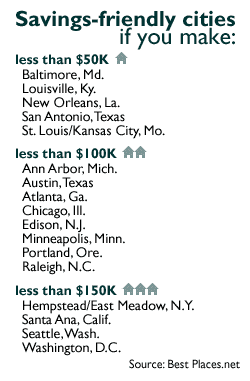|
Best cities for your money
|
 |
June 23, 2000: 3:10 p.m. ET
You know saving is a good thing; you'd like to do more. But where?
By Staff Writer Jeanne Sahadi
|
NEW YORK (CNNfn) - Let's face it: when you make less than a mint and live in a city that sucks your wallet dry for the privilege of a zip code, all the helpful savings tips in the world can ring hollow.
After paying for housing, utilities, taxes, transportation and insurance, not to mention food, clothing and the occasional vacation, the most you've got left are good intentions to sock away more than the minimum in your 401(k).
That doesn't have to be the case.
There are cities out there that can be kinder to your savings without necessarily robbing you of job opportunities or a decent quality of life, depending on your needs.
Caveat on what 'best' means
Of course, if your motto is "Manhattan or bust," help is not near. The same goes for those armed with a credit card and a taste for things they can't afford. No matter where you live or how much you earn, you can always spend yourself into a hole.
Keep in mind, too, that few people pick a city just because it's cheap.
 Other factors - career, family and friends - weigh much more heavily. So do lifestyle requirements, such as a need for outdoor activities, an active cultural life or a warm climate. Other factors - career, family and friends - weigh much more heavily. So do lifestyle requirements, such as a need for outdoor activities, an active cultural life or a warm climate.
That's why any study of "best cities" - no matter how extensive the measurements -- is interpretive to a large degree and offers you issues to consider, not a basis to move, said Bert Sperling, president of Best Places.net. "They help people think of new options," he said.
Living well on less
CNNfn.com asked Best Places.net to take at look at some medium to large cities that offered people making less than $50,000, $100,000 and $150,000 a year the best chances to save.
 The analysis took into account basic expenses, such as housing, groceries, health and auto insurance, as well as sales, property and local income tax and other cost-of-living factors. The analysis took into account basic expenses, such as housing, groceries, health and auto insurance, as well as sales, property and local income tax and other cost-of-living factors.
The findings, while not exhaustive, provide some affordable places to live that also score higher than average on some popular quality of life factors, such as recreation and arts outlets, a low crime rate, school choice or a temperate climate.
Of course, any city has its pros and cons, and some of its economic factors will be less favorable than others.
"It's like a balloon. You push on one side and it bulges on the other. There's no easy answer," Sperling said.
Pick your poison
Take Atlanta, which, according to Best Places.net, might be a good choice for those making $100,000 or less.
 Housing there may be more affordable than other large cities. But since the city is so spread out, a home you can afford might be far from downtown, said Atlanta-based certified financial planner Kyle Flynn. That means you might incur more in transportation costs and forfeit more of your time in heavily trafficked commutes. Housing there may be more affordable than other large cities. But since the city is so spread out, a home you can afford might be far from downtown, said Atlanta-based certified financial planner Kyle Flynn. That means you might incur more in transportation costs and forfeit more of your time in heavily trafficked commutes.
Or if you live in Santa Ana or other parts of southern California, your water bill may be 25 percent to 30 percent higher than what you would pay in a Midwestern city because of drought-like conditions, said Ken Stern, author of 50 Fabulous Places to Retire in America. "It's almost like a sin tax," he said.
Some states, such as Nevada, Texas and Washington, might have no income tax, but instead impose high sales or property taxes. But if housing costs are relatively low or you only want to rent, that might not be such a bad tradeoff, Stern said.
Look at what's being measured
Another study on the best metropolitan areas to save, conducted by insurance provider ReliaStar, factors in not only cost-of-living expenses but indicators of savings potential such as average household earnings and savings, job creation and the number of households with life insurance policies.
Click here for CNNfn.com's top personal finance stories of the week.
Keep the affluence going by balancing your portfolio
Wall Street's lazy days of summer
We're outta here cheap!
Got fund questions? Ask top managers going to Morningstar
That explains in part why a high-priced metropolitan area like San Jose, Calif., in the heart of Silicon Valley, is ranked among the Top 10 places to save. Its average earnings and job creation scores are high, but so, too, is the median price for a home, measured by years of income required to make a purchase. Translation: If you're not pulling in a dazzling dot-com salary, the place can be pricey.
All a matter of priorities
At the end of the day, "It comes down to a matter of priorities," Flynn said.
When he works with clients, he deals with their desires first, including where and how they want to live, and then deals with the issue of how much money they will need to meet those desires.
Flynn, like other planners, says that one of the toughest parts about getting clients to save on a regular basis is first getting them to figure out how much they're spending. "They may think the house is eating up their money, but it could be those trips to the ATM machine," he said.
Is your dream home killing you?
Or it could actually be the house. Some people contribute 50 percent of their gross salary to housing costs, thereby quashing any hopes of saving seriously, Stern said
"A home is not always your best investment," he said, noting that you should not pour money into your house at the expense of maximizing your 401(k) contributions, one of the easiest and most effective ways to build your retirement nest egg.
Many financial experts recommend you put no more than 20 percent to 25 percent of your gross income into housing costs. But Stern is even more aggressive, recommending you limit your expenditure to 15 percent.
Sound tough? It might be less so if you live in the Midwest, the Carolinas or a place like Austin, Texas, where the median price of a house is $125,100, according to Best Places.net. You may not live next door to Michael Dell, but you probably won't be embarrassed to invite him to dinner.
Be savings savvy with your salary
Keeping your housing costs in check is key to boosting your savings rate, but an ample salary, particularly in a lower cost area, can also make your life easier.
But don't think you won't need to be disciplined about saving even if you're well compensated, Flynn cautioned. "People tend to live up to whatever they're making."
Surprised by some of the places mentioned in this story? Send us your recommendations on good places to live and save at mailto:retirement@cnnfn.com 
|
|
|
|
|
 |

|

